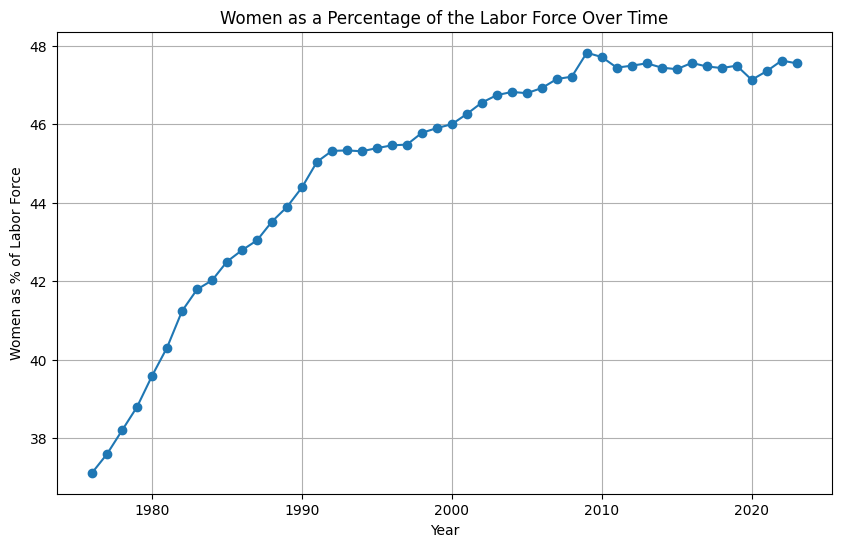Is Marriage the Strongest Predictor of Wealth in Canada?
Love, they say, is a many-splendored thing. But I can tell you with confidence that, in Canada at least, it also pays handsomely.
Sharp downward trends in fertility rates are pointing to a bleak future. And as we’re discovering, immigration isn’t necessarily going to save us. Working on the reasonable assumption that the high costs of raising kids were holding us back, governments have been working for decades to encourage childbirth through programs like the Canada Child Tax Benefit. Their hearts were in the right place, but the result haven’t been great.
The child and family support programs have been significant. For example, the average total of government support transfers in inflation-adjusted dollars paid to single parents have grown from $11,600 in 1976 to $19,400 in 2022. That amounts to around 29 percent of their average total earned income. Benefits for couples with children nearly tripled from a 1976 average of $5,800 to $15,300 by 2022. Those transfers included child benefits, employment insurance benefits, and social assistance.
But it turns out that even without government programs, marriage and parenting are both financially rewarding endeavors. In 2022, According to Statistics Canada, the average individual “not in an economic family” earned just $53,400 from both market (i.e., earned) income and government support. That same year, couples earned $135,600 - an increase of around 51 percent over what they would have earned in 1976. And the average couple with children took $169,900 home. For comparison, single parents earned just $80,100.
Of course it’s possible that couples who happen to be wealthier are more likely consider themselves capable of raising children, so to some extent they’re self-selecting. And some singles feel unable to start families because of crazy housing costs. Nevertheless, it seems that marriage and, to a lesser degree, parenthood are important predictors of higher income.
Are government social support programs behind the imbalance? Not so much. The average couple in 2022 received $7,300 in benefits, but that’s significantly less than the $9,800 that the average singles (without kids) got. In fact, it’s also a lot less than the $10,400 childless couples would have received from the government in 1976.
It’s clearly earned income that’s driving the greater wealth of both couples as a whole and couples with children.
This isn’t a new development. Throughout the half century since 1976 - when you exclude government benefits - couples have out-earned singles by an average of 140 percent. And couples with children have earned an average of 12.5 percent more than couples in general.
The bottom line is that couples - both with and without children - earn significantly more than both single parents and singles living outside of a family unit. This economic reality has persisted through financial crises, evolving government policy standards, and social upheavals.
That knowledge could play a role in young peoples’ thinking as they plan their lives. But it’s also one of many reasons that we, as a society, should aggressively protect the integrity of the family as an institution. All things being equal, families lead to better outcomes.
This idea is something found in no less a source than the United Nation’s Universal Declaration of Human Rights (Article 16):
The family is the natural and fundamental group unit of society and is entitled to protection by society and the State.
There is something a bit strange about all this data that I can’t explain. between 1990 and 2004, the difference between total income of couples with children and total income of single parents was significantly greater than the years either before or since.
Many things happened in the early 90’s that might have triggered the growing disparity (like the introduction of the Canada Child Tax Benefit, increasing access to childcare, or a narrowing gender pay gap), but none of them suddenly stopped in 2004. And one could imagine similar social and policy changes that might have reduced the disparity after 2004 (like increased female workforce participation), but none of them really began in 2005.
That odd differential certainly looks real. But maybe it doesn’t mean anything. Sometimes a cigar is just a cigar. Any thoughts to share?



I'm a little bemused to find that families are the government's job. Where'd that come from?
How about just backing off and admitting that families are not the government's business; that families are the business of citizens and that the ONLY constructive thing a government could do would be to get out of the way.
Marriage & kids are strong social ties. In addition to the systemic supports for marriage and kids, the economies of scale really add up over a decade or two. Even something as simple as cars and insurance saved us thousands over the past decade or so. Changing primary owner to my partner and myself as a secondary driver (dispite having a clean record) meant lower fees on a shared asset. Heck even car rentals are $15/day for an additional driver unless there is proof the additional driver is your spouse.
At a more holistic level strong social connections add resilience. That resilience can increase the probability that when disruptions are introduced such as a job loss, a sickness, an eviction, etc the shared resources can help buffer what might send any individual with weak social supports into a dangerous downward spiral... affecting far more than just their income